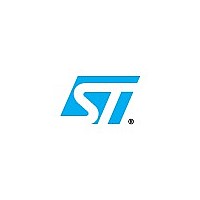ST72321R6-Auto STMicroelectronics, ST72321R6-Auto Datasheet - Page 128

ST72321R6-Auto
Manufacturer Part Number
ST72321R6-Auto
Description
8-bit MCU for automotive with 32 Kbyte Flash, 10-bit ADC, timers, SPI, SCI and I2C interfaces
Manufacturer
STMicroelectronics
Datasheet
1.ST72321R9-AUTO.pdf
(243 pages)
Specifications of ST72321R6-Auto
Hdflash Endurance
100 cycles, data retention 20 years
Clock Sources
crystal/ceramic resonator oscillators, internal RC oscillator and bypass for external clock
4 Power Saving Modes
Halt, Active Halt, Wait and Slow
- Current page: 128 of 243
- Download datasheet (3Mb)
Serial peripheral interface (SPI)
14.5
14.5.1
Note:
14.5.2
14.5.3
Note:
128/243
Error flags
Master mode fault (MODF)
Master mode fault occurs when the master device has its SS pin pulled low.
When a Master mode fault occurs:
●
●
●
Clearing the MODF bit is done through a software sequence:
1.
2.
To avoid any conflicts in an application with multiple slaves, the SS pin must be pulled high
during the MODF bit clearing sequence. The SPE and MSTR bits may be restored to their
original state during or after this clearing sequence.
Hardware does not allow the user to set the SPE and MSTR bits while the MODF bit is set
except in the MODF bit clearing sequence.
Overrun condition (OVR)
An overrun condition occurs, when the master device has sent a data byte and the slave
device has not cleared the SPIF bit issued from the previously transmitted byte.
When an Overrun occurs:
●
In this case, the receiver buffer contains the byte sent after the SPIF bit was last cleared. A
read to the SPIDR register returns this byte. All other bytes are lost.
The OVR bit is cleared by reading the SPICSR register.
Write collision error (WCOL)
A write collision occurs when the software tries to write to the SPIDR register while a data
transfer is taking place with an external device. When this happens, the transfer continues
uninterrupted; and the software write will be unsuccessful.
Write collisions can occur both in master and slave mode. See also
management on page
A “read collision” will never occur since the received data byte is placed in a buffer in which
access is always synchronous with the MCU operation.
The WCOL bit in the SPICSR register is set if a write collision occurs.
No SPI interrupt is generated when the WCOL bit is set (the WCOL bit is a status flag only).
Clearing the WCOL bit is done through a software sequence (see
The MODF bit is set and an SPI interrupt request is generated if the SPIE bit is set.
The SPE bit is reset. This blocks all output from the device and disables the SPI
peripheral.
The MSTR bit is reset, thus forcing the device into slave mode.
A read access to the SPICSR register while the MODF bit is set.
A write to the SPICR register.
The OVR bit is set and an interrupt request is generated if the SPIE bit is set.
123.
Doc ID 13829 Rev 1
Figure
Slave select
60).
ST72321xx-Auto
Related parts for ST72321R6-Auto
Image
Part Number
Description
Manufacturer
Datasheet
Request
R

Part Number:
Description:
8-BIT MCU WITH NESTED INTERRUPTS, FLASH,10-BIT ADC, FIVE TIMERS, SPI, SCI, I2C INTERFACE
Manufacturer:
STMicroelectronics
Datasheet:

Part Number:
Description:
STMicroelectronics [RIPPLE-CARRY BINARY COUNTER/DIVIDERS]
Manufacturer:
STMicroelectronics
Datasheet:

Part Number:
Description:
STMicroelectronics [LIQUID-CRYSTAL DISPLAY DRIVERS]
Manufacturer:
STMicroelectronics
Datasheet:

Part Number:
Description:
BOARD EVAL FOR MEMS SENSORS
Manufacturer:
STMicroelectronics
Datasheet:

Part Number:
Description:
NPN TRANSISTOR POWER MODULE
Manufacturer:
STMicroelectronics
Datasheet:

Part Number:
Description:
TURBOSWITCH ULTRA-FAST HIGH VOLTAGE DIODE
Manufacturer:
STMicroelectronics
Datasheet:

Part Number:
Description:
Manufacturer:
STMicroelectronics
Datasheet:

Part Number:
Description:
DIODE / SCR MODULE
Manufacturer:
STMicroelectronics
Datasheet:

Part Number:
Description:
DIODE / SCR MODULE
Manufacturer:
STMicroelectronics
Datasheet:

Part Number:
Description:
Search -----> STE16N100
Manufacturer:
STMicroelectronics
Datasheet:

Part Number:
Description:
Search ---> STE53NA50
Manufacturer:
STMicroelectronics
Datasheet:

Part Number:
Description:
NPN Transistor Power Module
Manufacturer:
STMicroelectronics
Datasheet:










